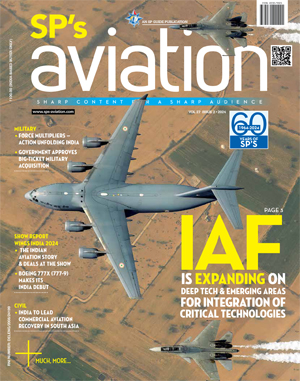INDIAN ARMED FORCES CHIEFS ON
OUR RELENTLESS AND FOCUSED PUBLISHING EFFORTS

SP Guide Publications puts forth a well compiled articulation of issues, pursuits and accomplishments of the Indian Army, over the years

I am confident that SP Guide Publications would continue to inform, inspire and influence.

My compliments to SP Guide Publications for informative and credible reportage on contemporary aerospace issues over the past six decades.
Public Sector has No Role in Civil Aviation
Unfortunately, Pawan Hans has suffered the ills that PSUs are invariably afflicted with such as bureaucratic management, unprofessional planning, low efficiency, poor performance and lack of accountability

After the financial turmoil that has had a debilitating impact on Jet Airways, one of the leading carriers in the private sector of the Indian airline industry, bringing its operations to a grinding halt, it is now the state-owned helicopter company Pawan Hans that appears doomed to suffer the same fate.
With its headquarters in Noida and regional offices in Delhi and Mumbai, Pawan Hans was set up initially as Helicopter Corporation of India on October 15, 1985 as a Public Sector Undertaking (PSU), to provide helicopter services in the country in the civil sector. However, the company was renamed as Pawan Hans two years later. Having flown over one million hours and recorded 2.5 million landings since commencement of operations, the company achieved the status of a Mini Ratna-I PSU. It is also the first ISO 9001:2000 certified aviation company in India.
Operating from its base at Juhu airport in Mumbai, Pawan Hans has been providing helicopter services to the Oil and Natural Gas Commission (ONGC) to its off shore platforms. This comprised the bulk of its total operations. In addition, this PSU has been providing services to the various state governments in India as well, especially in the remote areas of the North East region to cover locations not easily accessible by rail or road transport. A significant contribution by the company has been by way of its operations in Andaman and Nicobar as also in the Lakshadweep and Minicoy islands located deep into the oceans, providing inter-island services as well as connecting the islands in the Arabian Sea to the Kochi international airport. Pawan Hans has also been providing helicopter service to Vaishno Devi for devotees as also to the Border Security Force and to the Maharashtra Police for medical and logistics support in the event of Maoist attack on the troops. Currently, Pawan Hans is a joint venture between the government which holds 51 per cent stake and ONGC holding the remaining 49 per cent. More recently, plans were afoot to include Pawan Hans in the national effort to operate services under the Udan Regional Connectivity Scheme of the government to provide a boost to the Indian civil aviation industry. Unfortunately, there have been some impediments, albeit claimed to be temporary, to the fruition of this scheme.
As a PSU, Pawan Hans was provided with all the support and resources that it needed to establish, grow and expand its operations across the country. Unfortunately, it also suffered the ills that PSUs are invariably afflicted with such as bureaucratic management practices, unprofessional planning, low efficiency, poor performance and lack of accountability. Pawan Hans was thus plagued with these problems right from its inception. To begin with, the decision to procure the Westland helicopter itself was inherently flawed as this platform was fitted with untried and technically faulty Rolls-Royce engines. Soon after the Westland helicopters were inducted, some of them had to be grounded on account of a series of engine problems. This combined with endemic shortage of pilots and inadequate maintenance infrastructure, contributed to making Pawan Hans an operator with the worst flight safety record in the world. Over a period of 17 years, there were 21 crashes with 67 lives lost.
As a PSU, Pawan Hans was totally patronised by the government and the ONGC for business on account of which it did not focus on the development of any other market and was out-priced even in its own sphere of operations. With 46 helicopters on its inventory, Pawan Hans today has an ageing fleet. Apart from the consequent serviceability issues, the older the helicopters get, more costly is their maintenance affecting the company’s balance sheet. But what is more disconcerting is that ageing fleets aggravate flight safety issues which has been a problem with Pawan Hans. A large part of its inventory consists of Dauphin helicopters that have been operating for around three decades in hostile off-shore environment that has affected its operational efficiency.
Apart from administrative, operational, technical and maintenance issues highlighted above, the plight of the company extends to the financial regime as well. While reviewing the overall performance of the company, it has been observed that the company has been facing an unhealthy financial situation. As per a circular from the company, in terms of financial performance, the revenue has sharply declined in the financial year 2018-19 and the company has incurred a net loss to the tune of 89 crore during this period. The situation has got further aggravated on account of the huge outstanding amounts lying with various customers. The sum total of the dues to the company by various customers has risen to alarming levels of more than 230 crore.
In view of the preceding, there is undoubtedly the need for complete overhaul and to address the weak areas that prevail in the management of Pawan Hans. The plight of Pawan Hans reinforces the view that in the Indian civil aviation industry, the public sector really has no role to play.





